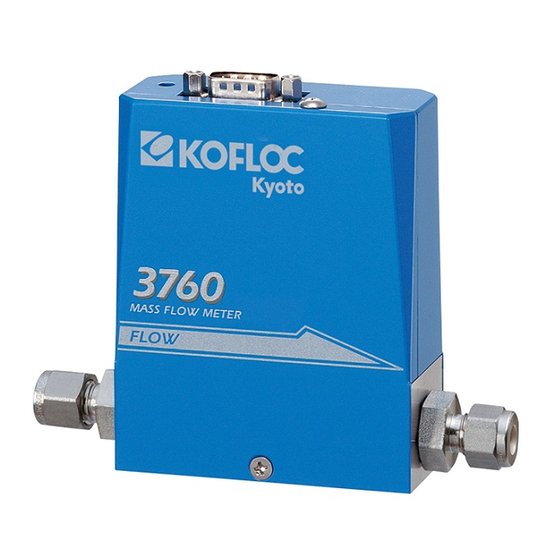
Table of Contents
Advertisement
Quick Links
Advertisement
Table of Contents

Summary of Contents for Kofloc 3765
- Page 1 MJ400087G1 Thermal Mass Flow Meter MODEL 3760 Series Instruction Manual...
- Page 2 MJ400087G1 《Prior to Use》 and 《Precautions for Safe Use》 Various visual signs are contained in this manual and attached to the product to ensure correct handling of the product and to prevent possible personal injury and property damage. Their meanings are as follows. Ignoring this sign and handling the product incorrectly !...
-
Page 3: Table Of Contents
MJ400087G1 Contents 1. Precautions for Handling 1-1 Checking the ID Plate 1-2 Precautions for Transportation 1-3 Precautions for Product Storage 2. Overview 2-1 Principle of Operation 2-2 Standard Specifications 2-3 Outline 3. Configuration 3-1 Configuration of the Thermal Mass Flow Meter 3-2 Precautions 4. -
Page 4: Precautions For Handling
【1-2 Precautions for Transportation】 To prevent damage during transportation, it is requested that the product be moved to the installation site in the style as it has been received from KOFLOC. 【1-3 Precautions for Product Storage】 If the product will not be put in operation for a long period of time after it arrived at your site, failures may develop for unexpected reason. -
Page 5: Overview
MJ400087G1 2. Overview Model3760 series are electric mass flow meter. It can use as a mass flow rate measurement instrument of various gases. 【2-1 Principle of Operation】 The flow detect sensor is wound by heating wires on the outside of the metallic capillary in two places. When gas flows to this capillary, the heat of the heating wire in the upstream is removed by the gas and its temperature drops. -
Page 6: Outline
MJ400087G1 【2-3 Outline】 Note: Please do not connect NC terminals of the above table, these terminals were connected to electric circuit in inside. -
Page 7: Configuration
+5 VDC±5% 120 mA One set of special connecting cables (If a cable longer than 1 m is required, please contact KOFLOC.) 2) Electric wiring diagram of the mass flow meter Model 3760series. Example: A combination of Model 3760series and PSK-1FB and DPM-3 【3-2 Precautions】... -
Page 8: Installation
MJ400087G1 4. Installation Install the meter in a place that is free of dust, dirt and water and take measures to prevent insulation failure due to condensation. If the temperature of the installation site is likely to rise due to equipment around the meter, provide necessary precautions such as installing a cooling fan to ensure good ventilation. -
Page 9: Contamination Of The Piping System
MJ400087G1 【4-2 Contamination of the Piping System】 Be sure to use well-cleaned pipes and joints for piping. A standard filter has been installed. However, if a large amount of dust adheres, the gas flow will be disturbed. In particular, if air from a compressor or blower fan is used, it is likely that a large amount of oil mist and water may enter the meter. -
Page 10: Run
, the actual flow rate is 1.43 times the indicated flow rate. For detailed data of the conversion factors, please contact KOFLOC. 6. Troubleshooting If the meter is considered to have failed, in order to prevent short circuit accidents, never use the connector pins of the meter to check output voltages, but be sure to use such safe places as the check terminals of the connected equipment. -
Page 11: No Output
【6-3 Significantly Different Flow Rate Indication】 1 Calibrate the span with the reference flow meter. Span calibration error Piping ・・・・・・・・・・・・・・・・・ Stop the leak. 2 Gas leak Sensor, valve ・・・・・・・・・・ Contact KOFLOC. 【6-4 Significantly Different Zero】 Incorrect power supply 1 Replace the power supply. voltage 2... - Page 12 MJ400087G1 URL:http://www.kofloc.co.jp...
















Need help?
Do you have a question about the 3765 and is the answer not in the manual?
Questions and answers